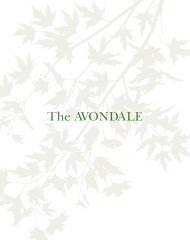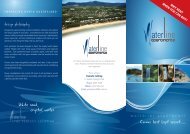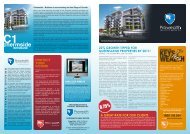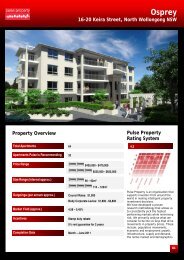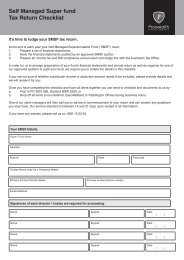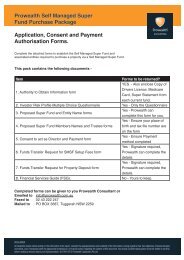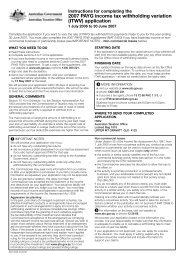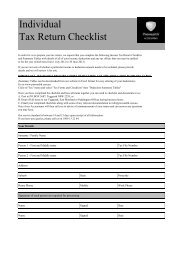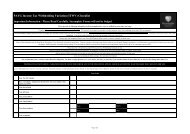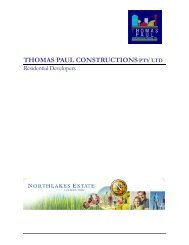Truck drivers - claiming work-related expenses - Prowealth
Truck drivers - claiming work-related expenses - Prowealth
Truck drivers - claiming work-related expenses - Prowealth
You also want an ePaper? Increase the reach of your titles
YUMPU automatically turns print PDFs into web optimized ePapers that Google loves.
http://www.ato.gov.au/individuals/PrintFriendly.aspx?ms=individuals&d...<br />
4 of 9 12/11/2012 11:47 AM<br />
Remember<br />
Allowances<br />
When you complete the declaration on your tax return you are declaring that everything you have told us is<br />
true and you can support your claims with written evidence.<br />
You are responsible for providing proof of your <strong>expenses</strong>, even if you use a registered tax agent.<br />
The most common allowances paid to an employee truck driver are:<br />
overtime meal allowance<br />
travel allowance (meal allowance).<br />
In the trucking industry, a travel allowance paid when you have to sleep away from home is sometimes referred to as a livingaway-from-home<br />
allowance.<br />
Travel allowance<br />
A travel allowance is an amount you receive that could reasonably be expected to cover your meals and <strong>expenses</strong> incidental<br />
to your <strong>work</strong>-<strong>related</strong> travel.<br />
A token amount you receive as a travel allowance that does not reasonably cover your travel costs is not accepted as being a<br />
travel allowance.<br />
If you receive a cents per kilometre allowance, you may receive a higher cents per kilometre rate when you must stay away<br />
from home overnight. The increased cents per kilometre rate is not accepted as being a travel allowance.<br />
Travel allowance is different to living-away-from-home allowance. Living-away-from-home allowance is paid to cover your additional<br />
accommodation and meal costs when you live in a second home because your employer requires you to <strong>work</strong> away from your usual<br />
home for a long period to do your <strong>work</strong>. Living-away-from-home allowance is usually subject to fringe benefits tax and is not shown on<br />
your payment summary.<br />
If your living-away-from-home allowance appears on your payment summary and is paid to you to cover meal <strong>expenses</strong> because you<br />
have to sleep away from home, you should treat it as a travel allowance.<br />
Regardless of how much allowance you receive, you can claim only a deduction for the <strong>expenses</strong> you paid. That is, if you paid $80 in<br />
<strong>work</strong>-<strong>related</strong> <strong>expenses</strong> and you received a $100 allowance for those <strong>expenses</strong>, you can claim only $80.<br />
If you are <strong>claiming</strong> travel <strong>expenses</strong> and you received a travel allowance from your employer, you<br />
must record the allowance as income on your tax return at item 2.<br />
Reimbursements<br />
Example 2<br />
If your employer or any other person reimburses you for <strong>expenses</strong> you have actually incurred, the payment is called a<br />
reimbursement. An allowance is not considered to be a reimbursement.<br />
You cannot claim a deduction for <strong>expenses</strong> you incur if those <strong>expenses</strong> are reimbursed to you by your employer - you do not<br />
include a reimbursement on your tax return.<br />
An allowance is not considered to be a reimbursement.<br />
If you claim your motor vehicle <strong>expenses</strong> from your employer using the cents per kilometre method, the amount you receive is<br />
considered to be an allowance.<br />
Troy had to use his car to meet another truck driver who had to stop driving his truck 20km away from the depot due to a<br />
mandatory long break. The driver returned Troy's car to the depot while Troy drove the truck.<br />
Troy was paid for the 20 kilometres he used his car based on the cents per kilometre rate plus the bridge toll he incurred.<br />
Even though Troy received a payment for using his car, the payment is not a reimbursement but an allowance, as it is only an<br />
estimate of the cost of using the car. Therefore, Troy must show the amount he received on his tax return at item 2.<br />
The amount Troy receives from his employer to cover the cost of the bridge toll is a reimbursement, and does not have to be<br />
included on Troy's tax return.



